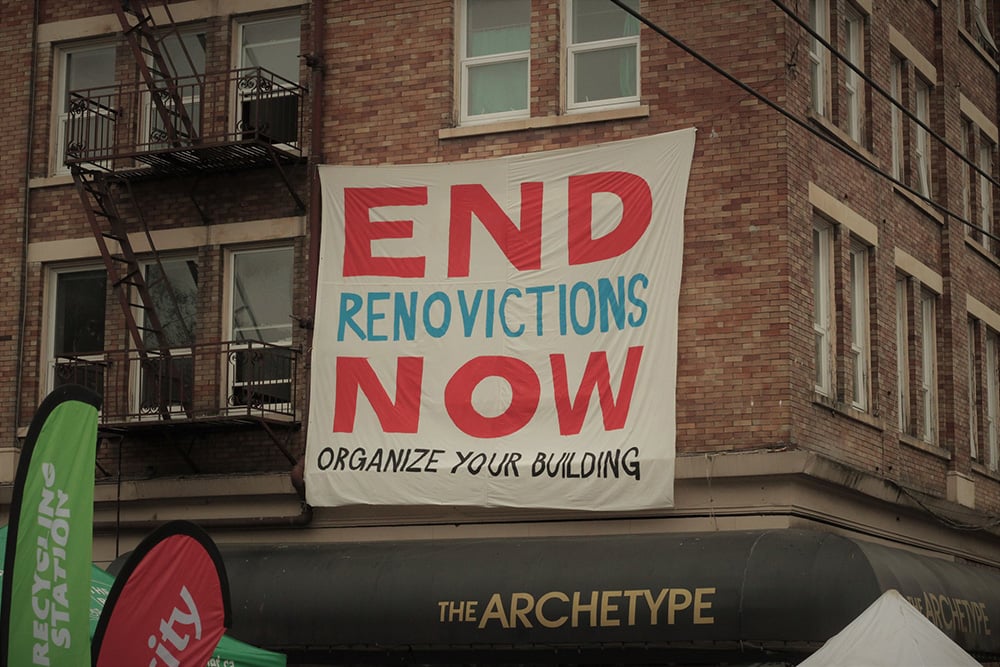An advocate for tenants in Vancouver says changes the B.C. government announced this week will provide some help to renters, but they will still allow landowners to use renovations as an excuse to evict people.
“What we’ve actually got is a legislated framework to allow renovictions,” said Will Gladman, a member of the Vancouver Tenants Union. “Fundamentally the provincial government has chosen not to end renovictions.”
Earlier this week the government introduced the Tenancy Statutes Amendment Act, 2021, a bill that was given second reading Tuesday.
Its key measures include extending the rent freeze that’s been in place during the pandemic to the end of the year, capping future rent increases at the rate of inflation instead of the previous inflation plus two per cent, and introducing new requirements for owners who want to evict tenants so that they can renovate the rented units.
Spencer Chandra Herbert, the Vancouver-West End MLA who chaired B.C.’s Rental Housing Task Force, said he’s heard many stories about tenants being evicted so a landowner could do renovations that turned out to be minor.
“People would be given an eviction notice, told they had to leave because there were massive renovations coming, only to find out, when they looked at the real work that was being suggested, it was just a coat of paint or just some tiles in the bathroom or kitchen,” he said.
“We heard about stories of massive rent hikes, we heard about bullying, we heard about the need for change for all sides. We know a lot of this was driven because people want to push a long-term tenant out so they can jack up the rent and make more money.”
If the bill becomes law, starting July 1 landowners will have to apply to the Residential Tenancy Branch before evicting tenants and demonstrate the renovations they are proposing are substantial and require the rental unit to be vacant.
Chandra Herbert said the government is strengthening the law to stop evictions based on non-existent or small renovations, while still allowing for owners to invest in buildings and maintain them. “No longer will people be getting eviction notices for renovations that don’t exist.”
Tenant union member Gladman said that if the government really wanted to stop renovictions it would simply remove the part of the Residential Tenancy Act that allows renovations to be given as a reason to evict people.
It doesn’t really make sense that a renovation should be a reason to break a tenancy agreement in the first place, he said, but it’s been enshrined in B.C. law for a long time.
Tenants should have a right to move back into renovated units without paying increased rent, he added.
Gladman also said it remains to be seen how the Residential Tenancy Branch will interpret the new rules and noted that a tightening of renoviction rules could easily lead to owners using other allowed reasons for evictions, like saying a family member wants to move in. “They haven’t touched them as far as I can see,” he said.
Gladman said one of the fundamental reasons owners want to evict people is because new tenants can be charged much higher market rates compared to those who have been leaving in a building for some time under rent increase limits.
Increasing supply with a flood of new social housing or other non-market housing would help, he added.
Gladman said the government could make one change that would go to the heart of the renoviction crisis.
Rent increase limits now only apply to existing tenants. If they move — or are renovicted — owners can charge the new tenants much higher rents.
Instead, Gladman said, the government could change the law so rent increases are capped even when tenants change.
“The province needs to institute vacancy control which would tie the rent to the unit, not the tenants. It would tackle a whole list of problems,” he said.
Chandra Herbert said the government considered tying rents to units rather than tenants but opted for what it saw as balance.
“I think what we want to do is make sure that we can have more rental housing in B.C., that the rental housing can be maintained in good order, and that the system is fair for all parties,” he said. “So I think it’s balance.”
Gladman said the government’s idea of “balance” doesn’t reflect the reality that landowners have a lot of power over the people who rent from them.
“Tenants rely on landlords to have a roof over their heads,” he said. “There is an inherent imbalance, and these changes don’t do much to address that.”
The competing interests are between the revenues available to landowners, many of whom are large companies that make big profits, and people’s ability to afford a home, Gladman said.
“The government looking for balance within that relationship is disappointing for reasons that I hope are obvious.” ![]()
Read more: BC Politics, Housing

















Tyee Commenting Guidelines
Comments that violate guidelines risk being deleted, and violations may result in a temporary or permanent user ban. Maintain the spirit of good conversation to stay in the discussion.
*Please note The Tyee is not a forum for spreading misinformation about COVID-19, denying its existence or minimizing its risk to public health.
Do:
Do not: